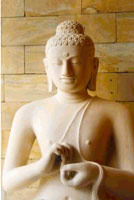Did Buddha live in 17th century B.C?
newindpress.com, January 12, 2006
VIJAYAWADA, India -- When was Lord Buddha born? Or when did he attain Nirvana? The answers to such puzzling historical questions may be found in the texts of puranas and scriptures.
 However, author Kota Nityananda Sastry in his latest book ‘Age of Lord Buddha’ makes a critical appreciation of available data compiled by Western historians who, he thinks, made a mess of Indian history.
However, author Kota Nityananda Sastry in his latest book ‘Age of Lord Buddha’ makes a critical appreciation of available data compiled by Western historians who, he thinks, made a mess of Indian history.
The Cambridge and Oxford histories of India accept 483 B.C as the date of Buddha’s nirvana. But, William Jones, on the basis of Chinese and Tibetan records infers that Buddha lived in the 11th century B.C.
Historian Fleet, who makes a study of ‘Rajatarangini’, thinks that Buddha lived in the 17th century B.C. Chinese monk Fa-Hien puts Buddha’s Nirvana at 1050 B.C. These contradictory theories may confuse one altogether.
The history that Buddha lived in the 5th century B.C was propounded by E.J Rapson who writes that the exact date of Buddha’s Nirvana is not known and hence the popularly accepted year of Buddha’s Nirvana is imaginary.
Sastry quotes his father Kota Venkatachelam’s treatise ‘Age of Buddha, Mililnda & Amtiyoka’, which establishes that Buddha lived between 1887 B.C and 1807 B.C.
Venkatachelam’s book ‘The Plot in Indian Chronology’ had gone into the history and the missing links in the chronology of events in Indian history.
Sastry states that Western scholars arbitrarily skipped 12 centuries of Indian history because their ‘hypothesis’ about Alexander’s invasion did not match with centuries-old Indian chronology.
The author asserts that Buddha was the contemporary of Kshemajit, Bimbisara and Ajatasatru, the 31st, 32nd and 33rd kings of Magadh respectively. This has been corroborated by the Puranic as well as Buddhist historical evidence, he adds.
Ultimately, Dr Sastry quoting evidences comes to the conviction that Lord Buddha was born in 1887 B.C and attained Nirvana in 1807 B.C.
Sastry can be contacted at 23-34-18, II floor, Manepallivari Street, S.N Puam, Vijayawada-11.

 However, author Kota Nityananda Sastry in his latest book ‘Age of Lord Buddha’ makes a critical appreciation of available data compiled by Western historians who, he thinks, made a mess of Indian history.
However, author Kota Nityananda Sastry in his latest book ‘Age of Lord Buddha’ makes a critical appreciation of available data compiled by Western historians who, he thinks, made a mess of Indian history.